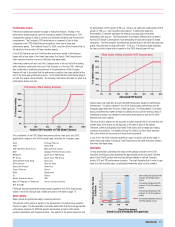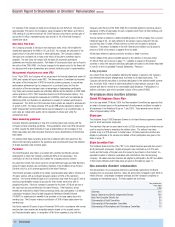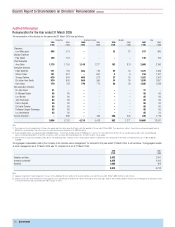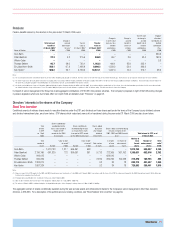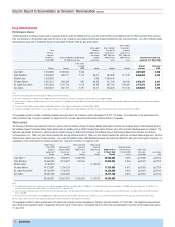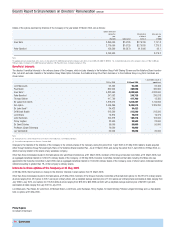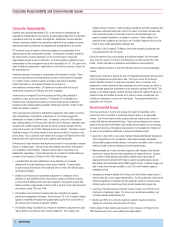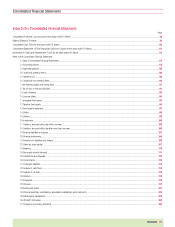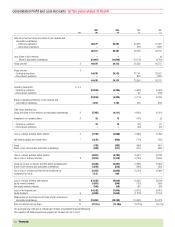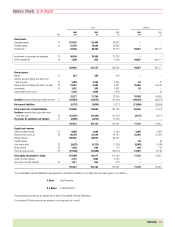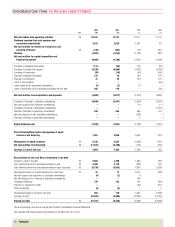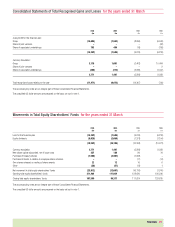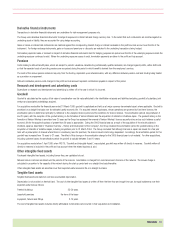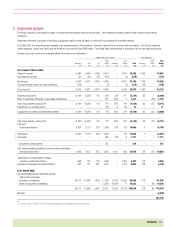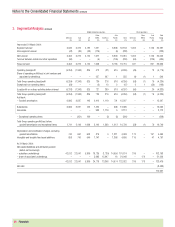Vodafone 2005 Annual Report Download - page 78
Download and view the complete annual report
Please find page 78 of the 2005 Vodafone annual report below. You can navigate through the pages in the report by either clicking on the pages listed below, or by using the keyword search tool below to find specific information within the annual report.
Corporate Responsibility and Environmental Issues
76 |Governance
Corporate Responsibility
Vodafone sees corporate responsibility (“CR”) as the process of understanding the
expectations of stakeholders in the Company and taking appropriate action to meet those
expectations where they are realistic and legitimate. Stakeholders include customers,
investors, employees, suppliers, the communities where the Group operates and where
networks are based, governments and regulators and representatives of civil society.
CR is relevant across all aspects of business strategy and is encapsulated in the
strategic goal of being a responsible business. The Executive Committee, chaired by
the Chief Executive, receives information on CR and the Director of Corporate
Responsibility provides a report to the Board. All mobile operating subsidiaries have a
representative on their management boards with responsibility for CR. CR is also at the
heart of Vodafone’s values and is clearly linked to one of the four passions, Passion for
the world around us.
Vodafone’s approach to business is underpinned by the Business Principles. These
cover both corporate and individual behaviour and are communicated to employees
in a number of ways, including induction processes, web-sites and briefings.
Further information on the Business Principles can be found on
www.vodafone.com/responsibility. CR matters are included within the Group’s
development programme for directors and senior managers.
Vodafone aims to integrate CR into the business and this is being reflected in
governance, policy, process and reporting. For example, CR is integrated into
Vodafone’s risk management processes such as the formal annual confirmation
provided by each mobile operating subsidiary detailing the operation of their controls
system as outlined on page 63.
These processes are supported by stakeholder engagement, which seeks to provide a
clear understanding of expectations of performance. The Group engages with
stakeholders in a variety of different ways. For example, during the 2005 financial
year, meetings relating to CR issues were held with over 20 investors, employees were
surveyed (with an 89% response rate) and the Group conducted research with the
public which involved over 12,500 interviews across ten markets. This helps to ensure
Vodafone is aware of the issues relevant to the business and that it is focused on the
priority areas. This is covered in more detail in the Company’s CR Report for the 2005
financial year, which can be found at www.vodafone.com/responsibility.
Performance is closely monitored and reports are provided to most subsidiary company
boards on a regular basis. This has driven demonstrable performance improvement
and is valuable in benchmarking. Progress is being made in responding to our
stakeholders’ expectations. Some examples are set out below and further details are
provided in the Company’s CR Report for the 2005 financial year:
•A specialist team has been established in Group Marketing to coordinate
development of socially beneficial products across Vodafone. Current projects
include products and services for the deaf and blind or others with difficulty using
conventional handsets;
•Vodafone commissioned an independent assessment of compliance with its
standards on age-classified content, chat services, games and Internet browsing.
A mobile Internet filtering service has been designed to help parents prevent their
children accessing inappropriate content and this is expected to be rolled out across
all operations during 2005 and 2006;
•The Vodafone Code of Ethical Purchasing has been integrated into supplier
performance management processes. During the year, 25 of the Company’s largest
suppliers completed self-assessment questionnaires against the Code and five on-
site reviews were conducted at suppliers’ facilities;
•The Vodafone Group Foundation has continued to implement a programme of grant
making activity in accordance with its mission statement. The Company, the
Vodafone Group Foundation, mobile operating subsidiaries and their foundations and
employees committed total funds of over £2.5 million to the Asian Tsunami relief.
This included the provision of free calls to and from the affected region and
employee matched donations in a number of countries. Further details of the
activities of the foundations are provided in the Foundation Yearbook which can be
found at www.vodafonefoundation.org/about; and,
•In addition to the Company’s CR Report, nine mobile operating subsidiaries have
now published their own CR reports.
During the year the Group commissioned and published research into the broader
socio-economic impacts of mobile in the developing world and launched the initial
results. Further information is available at www.vodafone.com/responsibility.
Vodafone retained its position in both the FTSE4Good and Dow Jones Sustainability
Indices.
Vodafone has continued to develop the level of independent assessment and assurance
of the CR programme and performance data. The scope of work for the Group’s
auditors (Deloitte & Touche LLP) has been extended to allow a conclusion to be
expressed on certain performance data procedures across the business, as well as to
review reporting against the requirements of the assurance standard AA1000AS. This
assures, in all material respects, whether reporting reflects the material CR issues for
Vodafone Group and whether processes are in place to ensure completeness, and
reporting on responses to concerns on those issues. The assurance statement is
published in the CR report.
Environmental Issues
The Group continues to monitor and manage the impact of its activities on the
environment and is committed to minimising adverse impacts in an appropriate
manner. Over the last twelve months, progress has been made across a series of
projects that address environmental issues. These include addressing the concerns
related to the perceived link between radio frequencies and health, the use of energy,
the reuse and recycling of handsets and accessories, the management of waste and
the use of ozone depleting substances. Examples of initiatives include:
•Approving, in April 2005, a new policy relating to Responsible Network Deployment.
This is supported by a set of guidelines to help mobile operating subsidiaries
achieve leading edge practices relating to community consultation, public concerns
relating to health, masts and phones and environmental impact;
•Making available up-to-date information regarding radio frequency field strength
values from locations that have been selected by an independent body. Fourteen
out of sixteen mobile operating subsidiaries published these values and all
measurements demonstrate that RF fields in publicly accessible places close to
base stations are substantially below ICNIRP guideline levels. Vodafone Hungary will
start to make the information available in July 2005 whilst Vodafone Japan is
undertaking a trial;
•Developing an energy modelling tool to help predict the climate change impact of
network expansion, and to support target setting. The Group has also carried out an
intensive programme of meetings with key equipment vendors to discuss energy
efficiency gains to be made through their product development programmes;
•Launching a handset reuse and recycling scheme in Egypt, one of the first such
schemes in a developing market. The Group now has schemes operating in all
controlled markets except Albania; and
•Sending over 90% of our network equipment waste for reuse and recycling,
meeting the commitment from last year’s CR report.
Further details of these initiatives are provided in the Company’s CR Report for the
2005 financial year and on www.vodafone.com/responsibility.



